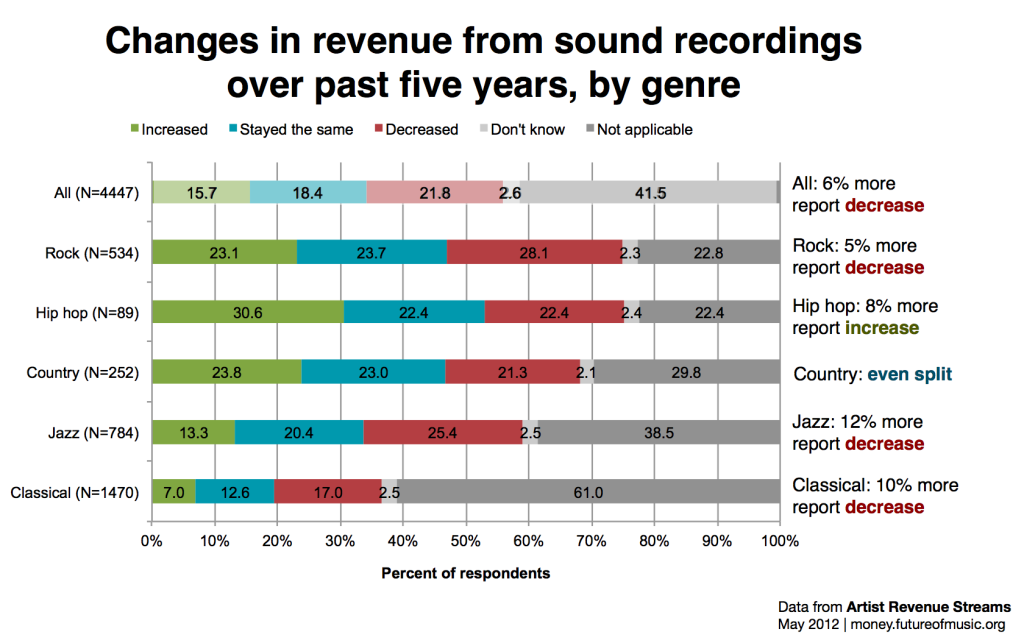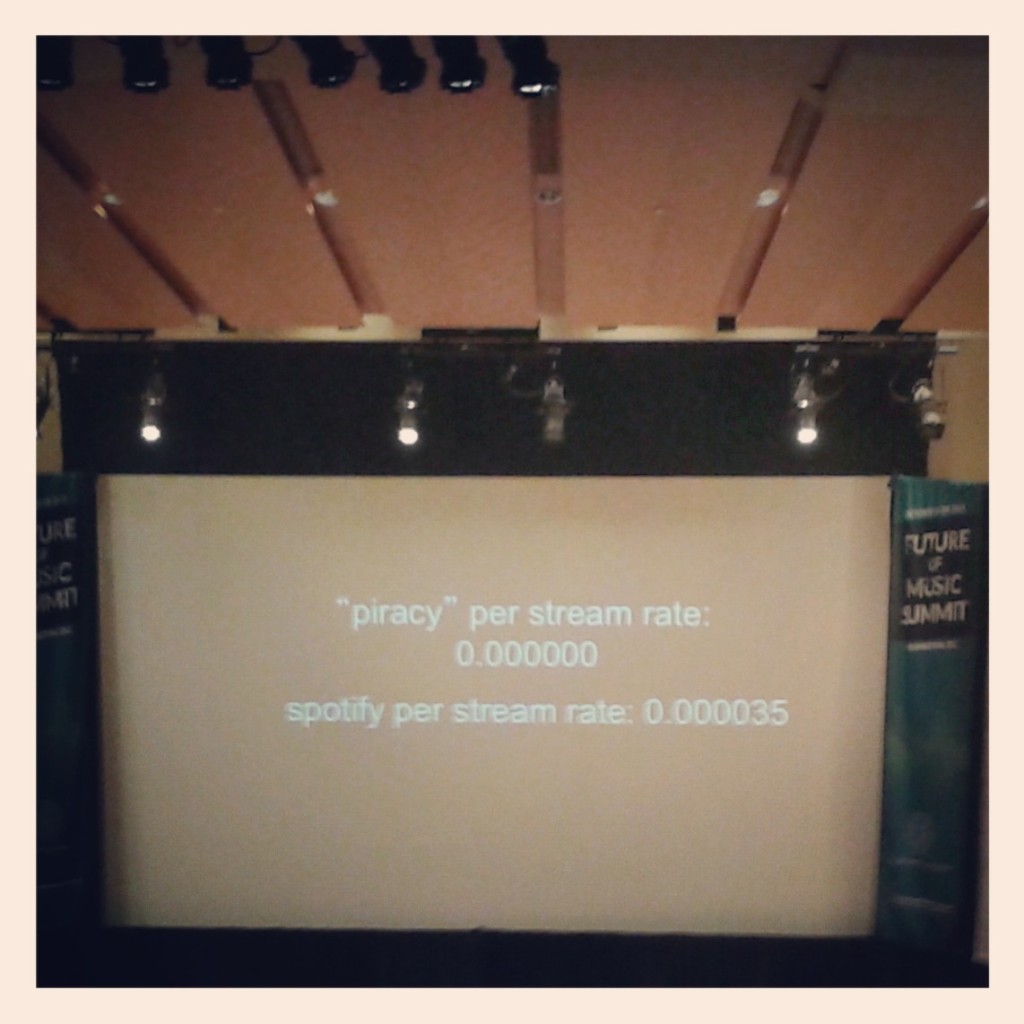CultCap was pleased to attend the Future of Music Coalition’s annual summit in Washington, DC this past week. A non-profit formed to advocate, educate and research on behalf of musicians in the digital age, the FMC “works to ensure a diverse musical culture where artists flourish.” They certainly lived up to their mandate this week; FMC did a superb job of organizing two days of enlightened presentations and vibrant discussions among a diverse group of industry professionals, advocates, politicians, musicians, and students.
The summit kicked off with a presentation by Jean Cook, the Director of Programs at FMC, summarizing the findings of a detailed survey on the many different avenues of artist compensation in the digital age. It was particularly noteworthy how much non-musical revenue streams (i.e. teaching, selling merchandise) account for an artist’s overall income. This statistic raises an important question about labour: What are the additional tasks or skill sets enable an artist to be financially sound in the contemporary music industries and should we require this additional labour from artists?
Revenue streams were a recurring theme throughout the conference, particularly the controversy over the negligible amounts of compensation artists receive for streaming music. Spotify has received a lot of negative press lately, with popular musicians like Thom Yorke, Nigel Godrich, David Byrne, and the Foals all bemoaning the lack of adequate compensation. Spotify (and similar streaming services such as Rdio and MOG) received a lot of criticism at FMC as well. Eddie Schwartz, President of the Songwriters Association of Canada, relayed the per stream rate he was seeing for the artists he represents: $ 0.000035, a number so negligible it was often just rounded down to zero for his smaller, independent artists. Schwartz advocated for his association’s concept of Fair Trade Music, an initiative that strives to achieve fair and transparent compensation for musicians, similar to the broader Fair Trade movement.
Melvin Gibbs – bass guitarist, composer and producer – also advocated passionately on behalf of the artist and fair compensation. “Musicians do not exist to justify a business model,” commented Gibbs, challenging the implicit commodity logic that often accompanies discussion of musician compensation. Peter Jenner – producer and manager of Sincere Management, whose clients have included Pink Floyd – provided a historical perspective, reminding the audience that intermediaries have been problematic in the music industry for at least 40 years, and this wasn’t necessarily an issue of old or new industries. The desire and need to shift power and agency to artists is an ongoing concern. Adding a bit of levity to the proceedings, Jenner also recommended that the audience stop being so “precious”: not all musicians will be successful and get paid. Music won’t move beyond a hobby for many artists and that is the historical norm.
While concerns over the uncertainty of new musical platforms were common, an alternative perspective on the newfound possibilities and opportunities in the digital age were another recurrent theme throughout the conference. David Macias – president of Thirty Tigers, a music label that works to return the vast majority of royalties back to its clients – talked about the success their business strategy was achieving for their musicians. His stance on the streaming services debate was more conciliatory, and claimed a much higher rate per stream than Eddie Schwartz had reported earlier, raising an important distinction in the streaming music service royalty debate: there are huge discrepancies among the negotiated rights for artists. Retaining your own publishing rights as an artist is a key strategy in the digital realm, one shared by Emily White, the co-founder of Whitesmith Entertainment, Readymade Records & Dreamfuel.Me. White stressed the importance of Brendan Benson (co-founder of Readymade) retaining the rights to his most recent music, which has resulted in a much more significant percentage of the royalties compared to his earlier work with a big label. The labour and difficulty involved in running your own label and controlling your own rights can be high, but so too are the possible returns.
Connecting more directly with fans and forming a more intimate community with one’s fanbase was another recurrent theme at FMC, an opportunity amplified for smaller musicians by new technologies. Crista Kende, the performing arts specialist for Indiegogo, spoke about crowdfunding platforms not just as interfaces to raise money, but rich opportunities to build a community and engage with your fans in a less commercial manner. Crowdfunded artists are not just selling a product, but participating in a more personal relationship built on direct communication. The final panel of the conference featuring a variety of musicians also reflected on this opportunity for technology-facilitated community, with the advantages (and some disadvantages) of social media being touted as a significant development for new and smaller artists. Simply connecting with fans across the merch table while on tour is something that the musicians also touted.
Here at the Cultural Capital Project, we believe that the artist-fan connection must be a key part of the equation for monetizing digital music. This relationship should not be controlled by intermediaries; rather, artists are the ones who must wield power in the digital music economy, determining their own relationships with intermediaries. There are exciting opportunities for establishing and sustaining a more direct artist-fan connection, in how fans share their favourite artists’ music, but more importantly, in how they compensate artists for their creativity. As a dynamic community of musicians, labels, producers, writers, and fans advances the discourses and debates surrounding how digital music industries might operate, we will continue to advocate for artists’ rights, equitable compensation, and a fan’s capacity to share culture and music. We’re glad that the conference provided us with the opportunity to hear so many bright, innovative ideas, and to have made some new allies and colleagues to help us move forward.



Pingback: brian fauteux | Future of Music and Reflektor